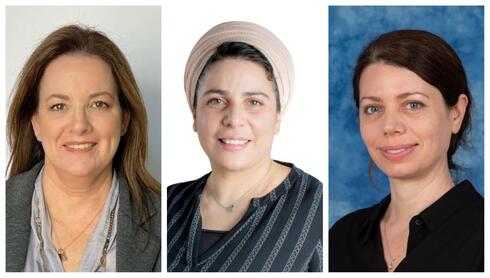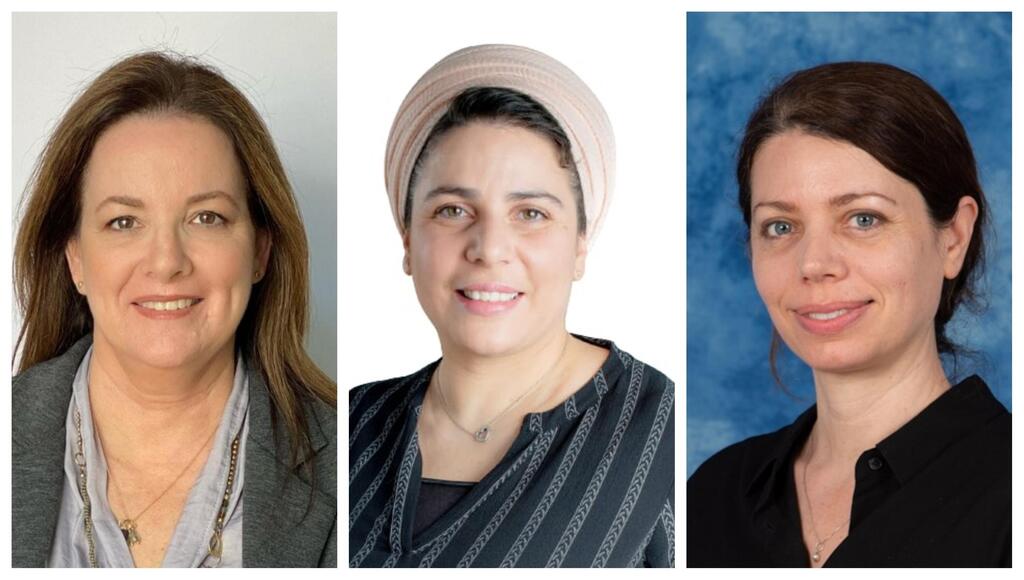
Boarding Pass
“We can bring relief, improve quality of life, and ensure better compliance with treatment for cancer patients”
EMRIS Pharma has raised $422,000 to help enhance the quality of life for cancer patients by preventing skin toxicities induced by EGFR inhibitors
EMRIS Pharma is currently developing cancer treatment with a therapy relating to a novel small molecule administered to prevent skin toxicities induced by EGFR inhibitors (EGFRi).
“In the current era of personalized medicine and targeted therapies, there is a notable occurrence of specific 'on target' toxicities,” explained Dr. Lyora Aharonov, Co-Founder and CEO of EMRIS Pharma. “These toxicities result in damage to tissues that express the molecular target extensively. Among the various antineoplastic molecular targeting agents, those that disrupt signal transduction… are particularly associated with severe skin toxicity.”
1 View gallery


Dr. Sharon Merim, Dr. Lyora Aharonov, and Professor Ofra Benny
(Photo: Racheli Zada / Mark Koltun / Yoav Dudkevitch)
The current approaches to treating skin toxicities induced by EGFR inhibitors during cancer treatment involve the use of skin moisturizers, sunscreens, topical steroids, and antibiotics, according to EMRIS Pharma. “While these measures may offer temporary relief, they do not address the fundamental cause of these toxicities,” said Dr. Lyora Aharonov.
EMRIS Pharma is developing a solution to block EGFRi monoclonal antibodies topically, meaning that its therapy targets the root cause: the drug-receptor interaction. “By proactively blocking this interaction, our innovative approach effectively reduces skin toxicity, allowing cancer patients to maintain their daily lives without compromising their vital anti-cancer treatments,” she added.
The company has an entirely female executive team and expects to begin human trials within three years. You can learn more about their journey below.
Company Name: EMRIS Pharma
Sector: Healthcare
Product/Service description:
EMRIS Pharma is revolutionizing cancer treatment with a groundbreaking therapy—a novel small molecule administered topically to prevent skin toxicities induced by EGFR inhibitors (EGFRi). Our innovative solution aims to significantly enhance the quality of life for cancer patients while improving their compliance with essential cancer treatments.
A vast majority of patients (~90%) undergoing EGFRi monoclonal antibody treatments, like Cetuximab and Panitumumab, suffer from severe skin toxicities that impair their well-being and often require dose reductions or interruptions in their anti-cancer drug protocols. Current treatment regimens, such as moisturizers, sunscreens, steroids, and antibiotics, provide limited relief, with the most effective treatment often being dose reduction or even drug discontinuation.
We are developing a first-of-its-kind solution to block EGFRi monoclonal antibodies topically. While current strategies focus on reducing symptoms after skin toxicity has occurred, our therapy specifically targets the underlying cause by preventing the trigger that induces the skin toxicity: blocking the EGFRi binding to the EGFR. By proactively blocking this interaction, our innovative approach effectively reduces skin toxicity, allowing cancer patients to maintain their daily lives without compromising their vital anti-cancer treatments. At EMRIS, we can bring relief, improve quality of life, and ensure better compliance with treatment for cancer patients.
Founder Bios:
Our team and current advisors possess a unique set of qualifications that make us well-suited to advance our science or technology.
Dr. Lyora Aharonov (CEO and Co-Founder), brings extensive expertise in applied research to our company. With over 15 years of experience in industrial and academic R&D, as well as 10 years in management, she possesses a strong background in both the technical and managerial aspects of the industry. Throughout the past decade, Dr. Aharonov has made significant contributions to several Biotech startup companies, leading research and development efforts for therapeutic treatments and diagnostic tools.
Dr. Sharon Merims (CSO and Co-Founder) has over 20 years of clinical experience in the dermatology-oncology field and brings a specific focus on treating skin toxicities induced by targeted therapies. Her extensive expertise provides our team with profound insight into the unmet needs and specific challenges associated with EGFRi-induced skin toxicities. Furthermore, her track record of leading clinical trials and bridging the gap between research and clinical practice expedites the opportunity to initiate a first-in-human clinical trial for our technology.
Professor Ofra Benny (CTO and Co-Founder), is the Head of the Lab for Nanomedicine and Tumor Microenvironment at HUJI. Professor Benny's specialization in nanomedicine, particularly in the development of targeted drug delivery systems, is highly relevant to our project. Our goal is to deliver the active pharmaceutical ingredient (API) to its target in the skin, and Professor Benny's expertise allows us to overcome the challenge of precise drug delivery.
Year of Founding: 2023
Last Investment Round: $422,000
Last Investment Stage: Pre-Seed
Date of Last Investment: May 2023
Total investment to date: $422,000
Investors (leading and all): Israel Innovation Authority and NGT Healthcare II
Current number of employees: 4
Open positions: N/A
Social Media:
https://www.linkedin.com/company/emris-pharma/
How was the idea born?
The inspiration for the idea behind SDT-011 stemmed from Dr. Merims' extensive experience of more than two decades in the oncology department. During this period, she observed numerous patients suffering from skin toxicities caused by biologically targeted therapies. Almost all patients treated with these drugs experienced skin issues, and the current treatment protocol, which focused on addressing the skin damage after it occurred, proved to be insufficiently effective.
Contemplating this challenge, Dr. Merims began exploring an alternative approach: Could we prevent the damage altogether by selectively blocking the cancer drug only at the site of toxicity? This idea sparked the development of SDT-011, together with Prof. Ofra Benny, who is an expert in drug development and delivery, the teams identified a novel small molecule designed to obstruct the binding of EGFRi monoclonal antibodies to the EGF-receptor of skin cells. This innovative topical application finally offers a potent treatment for the skin toxicities caused by these therapies.
What is the need for the product?
In the current era of personalized medicine and targeted therapies, there is a notable occurrence of specific 'on target' toxicities. These toxicities result in damage to tissues that express the molecular target extensively. Among the various antineoplastic molecular targeting agents, those that disrupt signal transduction, such as epidermal growth factor receptor (EGFR) inhibitors, are particularly associated with severe skin toxicity.
The most common cutaneous reaction observed in patients receiving these agents is known as papulopustular eruption, which resembles an acne-like rash. These lesions typically manifest on the face, scalp, and upper trunk, and they can be challenging to conceal. As a consequence, many patients find themselves either withholding or reducing their treatment due to the discomfort caused by skin reactions.
How is it changing the market?
EMRIS Pharma proposes a groundbreaking approach—we are developing a first-of-its-kind solution to block EGFRi monoclonal antibodies topically. While current strategies focus on reducing symptoms after skin toxicity has occurred, our therapy targets the root cause: the drug-receptor interaction. By proactively blocking this interaction, our innovative approach effectively reduces skin toxicity, allowing cancer patients to maintain their daily lives without compromising their vital anti-cancer treatments.
How big is the market for the product and who are its main customers?
The SDT-011 is aimed to be marketed as a bundle with prescribed EFGRi mAB. The treatment regimen strategy of SDT-011 cream will commence as a preventive tool and will be prescribed by the physician together with the EGFRi monoclonal antibody. The average use will be in accordance with the average use of the EGFRi monoclonal antibody (e.g. average of 8.5 months of cetuximab treatment in CRC).
The targeted recipients of this combined treatment are cancer patients who are undergoing treatment with EGFR-inhibitor monoclonal antibodies. This patient population comprises hundreds of thousands of individuals worldwide each year, making it a substantial market for this medical offering.
Does the product exist already? If not - at what stage is it and when is it expected to hit the market?
The product doesn’t exist yet. We expect to enter “first-in-human” trial within three years.
Who are the main competitors in this sector and how big are they?
The current approaches to treating skin toxicities induced by EGFR inhibitors involve the use of skin moisturizers, sunscreens, topical steroids, and antibiotics. While these measures may offer temporary relief, they do not address the fundamental cause of these toxicities.
EGFR signaling plays a crucial role in maintaining skin homeostasis, and its inhibition leads to an increased influx of inflammatory cells and the production of proinflammatory cytokines in the skin. Some competitors are focused on inhibiting the recruitment and activation of immune cells to reduce inflammation.
Another competitor has developed a topical B-Raf inhibitor that exploits the paradoxical effect of B-Raf inhibitors on epithelial cells, attempting to override MAP Kinase pathway inhibition. However, this approach carries a potential risk of tumorigenesis, as B-Raf inhibitors have been associated with increased rates of squamous cell carcinoma cases.
In contrast, our solution targets the root cause of skin toxicity induced by EGFR inhibitors by blocking the initial trigger, which is the drug-receptor interaction. While current strategies and other developments concentrate on symptom reduction after EGFR inhibition, our approach focuses on preventing the toxicity from occurring in the first place.
What is the added value that the founders bring to the company and the product?
The combination of Dr. Sharon Merims' extensive clinical experience in dermatology-oncology and her specific focus on EGFRi-induced skin toxicities, along with Professor Ofra Benny's expertise in nanomedicine and targeted drug delivery, and Dr. Lyora Aharonov’s leadership experience in Biotech startup companies, positions our team to advance the science or technology in a manner that directly addresses unmet needs and overcomes specific challenges. This collaboration greatly enhances our ability to make significant progress in our field and, ultimately, benefit patients.
What will the money coming in from the round be used for?
It will be used for the development of a stable and effective formulation for our topical treatment and for the planning of our regulatory roadmap.
In the "Startup Boarding Pass" section, CTech will cover the (relatively) small investments made in companies during the early stages of their existence - and the entrepreneurs and startups who have not yet had the opportunity to reveal their stories to the world. Please use the linked form and fill it out according to the guidelines. This form is intended for startups raising between $500,000 and $3 million from venture capital funds, angels, or official grants from Israeli and foreign institutions. If relevant, someone at CTech will be in touch for follow-up questions.













